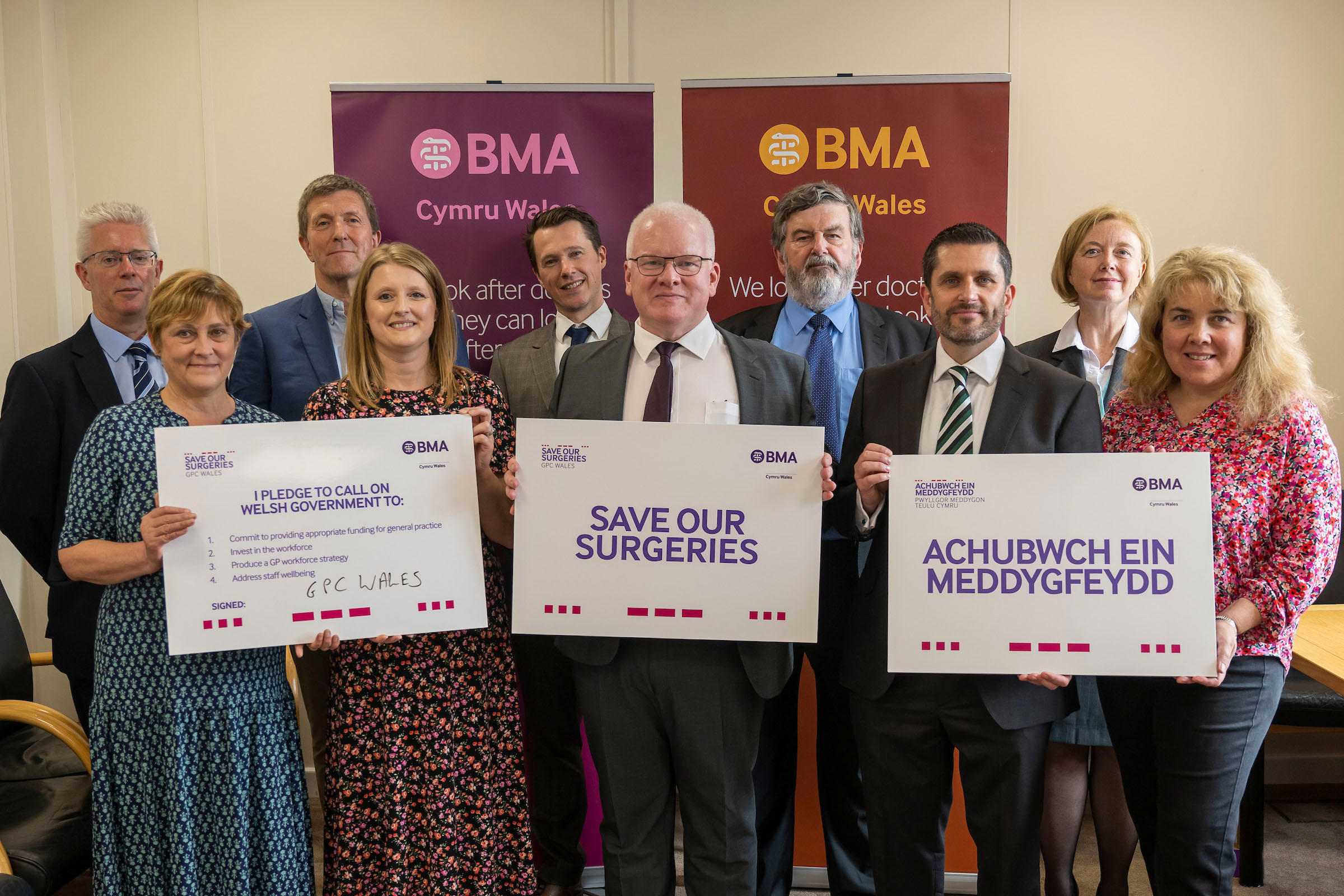A GP with more than 30 years’ experience shares a personal account of the impact of years of financial cuts to general practice in Wales, and why the service requires greater respect and protection as well as funding.
 Dr Thomas (back row, second from left) supports a BMA Cymru Wales campaign to save general practice
Dr Thomas (back row, second from left) supports a BMA Cymru Wales campaign to save general practice
The surge in workload
Since the easing of COVID restrictions, the workload has skyrocketed. During the pandemic, face-to-face consultations initially plummeted, and we adapted to online and phone consultations. However, as we returned to face-to-face consultations, the demand for rapid responses for increasingly complex issues surged.
We estimate that our contact volume has increased by at least 30% compared to 2019. Interestingly, while the number of patients remains constant, the frequency of people seeking reassurance, often for minor complaints, has soared.
Unsustainable pressures
This surge is unsustainable. The increased demand means we struggle to prioritise patients who clearly need our attention. The lowered threshold for seeking medical advice has led to a flood of less critical consultations, consuming increasing amounts of time, and resources. This situation is not only unsatisfactory but also unsafe.
Impact on morale and staffing
The relentless pressure has severely impacted morale. We have seen a significant exodus of salaried doctors and partners, some moving to other practices or leaving GMS practice altogether. The lack of protection and support in our contracts compared to health board employment exacerbates this issue. Rising operational costs, especially energy expenses, further strain our resources.
Despite these challenges, we continue to provide essential services, but the financial reality is grim. The misconception that our contract earnings are substantial is far from the truth; what remains after expenses is shrinking year on year, and the small amount of NHS spending allocated to general practice for patient care compounds the problem.
The domino effect
The long-term implications of losing staff are dire. Practices folding under pressure create a domino effect, with surrounding practices bearing the brunt. This ripple effect can escalate into a tsunami, overwhelming the system. The stress and uncertainty take a toll on our wellbeing, creating a demoralising and unsafe work environment, which clearly must have a negative impact on patient care.
A call for respect and support
To secure a healthy future for GPs in Wales, we need more than just financial support. Respect and support from all quarters are crucial. The current trend of shifting more work to primary care without consent or discussion is demotivating. Health boards are being asked to cut costs, further straining primary care support.
We need a fundamental shift in attitudes and a realisation that collaboration is essential. Funding is vital, but so is a change in how we are perceived and treated. This includes the view taken by Welsh Government, who seem only too happy for us to work under an open-ended contract whereby we are expected to deal with unlimited demand, whilst being micro-managed ineffectively with increasing central demands which are disproportionate to our function.
The impact of COVID-19 policies
The handling of COVID-19 booster vaccinations is a prime example of the challenges we face. Initially, our locally coordinated efforts were successful, but central interference and restrictive practices have made it increasingly difficult to operate as independent contractors.
The unilateral reduction in service costs for COVID boosters last year forced many practices, including ours, to opt out, highlighting a lack of good faith from the Welsh Government. This decision not only undermined our efforts but also demonstrated a disregard for the cost-effectiveness of GP-led immunisations.
The broader impact of defunding
Defunding social care has exacerbated the strain on primary care. Longer hospital stays and inappropriate use of hospital services reduce the support available to us. As the lowest common denominator, GPs are left to handle cases that may not be appropriate for primary care. This knee-jerk reaction to refer everything to GPs is unsustainable and indicative of a system run into the ground.
The need for change
So, how do we fix it? Clearly, funding is crucial, but an attitude change is also key. We feel taken advantage of financially and politically, often treated with disrespect as the service that will pick up matters that others deem inappropriate for themselves. This has always been the case, but now – with no reserves and working past capacity – it is unsafe, demoralising, and disrespectful.
We need respect for our profession and support from the Welsh Government. The current combative system leaves us feeling unsupported and undervalued.
A sustainable future
The Save Our Surgeries campaign by BMA Cymru Wales highlights these critical issues. We are at a tipping point where the sustainability of general practice is in jeopardy. It’s time for a collective effort to address these challenges, ensuring that GPs can continue to provide the essential care our communities rely on. Show us the respect we deserve, and let’s work together to create a future for general practice in Wales.
By sharing our experiences and advocating for change, we hope to secure a sustainable and respectful future for general practice in Wales.
Kevin Thomas is a GP at Pontcae Medical Practice in Merthyr Tydfil

